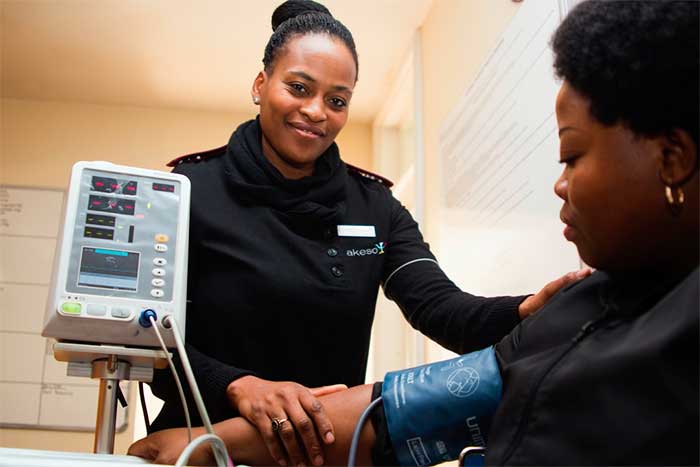Scientific and technological advances have expanded the healthcare industry, leading to new roles for healthcare providers. Decades ago, it was common to think of doctors and nurses as the people who provided healthcare services, with doctors diagnosing patients and ordering treatments and nurses assisting them and providing patient care.

Today, the roles of nurses in the United States vary widely. Individuals seeking a primary care provider may be told to look for an FNP-C. This article examines FNP-Cs and their role in the healthcare industry.
What’s an FNP-C?
A family nurse practitioner (FNP) is an advanced practice registered nurse (APRN) qualified to provide primary care to their patients. These nurse practitioners (NPs) treat patients of all ages and take a family doctor’s place. FNPs receive one of two designations when they’re certified. FNP-BCs complete a certification exam containing 175 questions. This exam is administered by the American Nurses Credentialing Center (ANCC).
FNP-C’s complete the American Academy of Nurse Practitioners (AANP) 150-question certification exam. The ANCC exam contains an additional 25 questions and emphasizes ethical and policy-related questions. The ANCC designation is preferable for individuals interested in pursuing research or a career in academia, while the AANP certification is ideal for nurse practitioners who plan to treat patients. Google “FNP-C meaning” to learn more about these medical care providers.
What education does an FNP-C need?
The NP certification exam is the final step in the educational process. To qualify to take the exam, nurse practitioners must complete several years of postsecondary studies. The first step involves earning an associate’s degree in nursing or a Bachelor’s of Science in Nursing (BSN). After graduating, individuals must pass the National Council Licensure Examination (NCLEX-RN) to become a registered nurse (RN).
RNs must obtain practical experience as an RN before entering a graduate program to earn a Master of Science in Nursing (MSN) degree. Once NPs complete their master’s degree program, they can choose which exam to take. MSN subject areas include pharmacology, diagnostic reasoning, and treating underserved populations. NPs can also opt to earn a Doctor of Nursing Practice (DNP) degree after obtaining their master’s degree.
Where do nurse practitioners work?
The U.S. Bureau of Labor Statistics (BLS) reports that 47 percent of APRNs work in medical offices. Another 27 percent work in hospitals. Outpatient treatment centers and schools may also employ APRNs.
Are there different nurse practitioner specialties?
FNPs are one of several different types of nurse practitioners. NPS can opt to specialize in family care and become FNPs. NPs may also opt to pursue a specialty in adult-gerontology or psychiatry. Psychiatric nurse practitioners provide mental health care. Like NPs, they assess, diagnose, and treat patients, but they work with patients with mental health issues. Adult-gerontology nurse practitioners treat adult patients.
What are the benefits of receiving care from an FNP-C?
Family nurse practitioners perform many of the same tasks family doctors perform. They may establish a family practice and are qualified to assess patients and provide preventative healthcare services, order tests, and initiate treatment plans for their patients. Your FNP can also prescribe medication.
FNPs know their patients and can make lifestyle recommendations. They may discuss the benefits of investing in your living space to ensure that you can safely stay in your home. They may advise aging patients or individuals with a disability to install non-slip flooring throughout their living space and add handrails in their bathroom. Your FNP may also recommend installing a walk-in shower if you have balance issues.
FNPs may also advise homeowners about repairs that you shouldn’t ignore. Having gutters cleaned out and replacing your roof will prevent water from pooling on your roof and seeping into your home. When water leaks inside, it can cause mold growth, which can lead to respiratory issues.
Are there other types of advanced practice nurses?
There are three main types of APRNs. In addition to NPs, APRNs include nurse-midwives and nurse anesthetists. Nurse-midwives provide patient care to women and individuals who are pregnant. They also deliver babies. Nurse anesthetists give patients anesthesia. They primarily work with patients who are having surgery and patients experiencing pain.
What are the job prospects for APRNs like?
While the BLS reports the job growth rate for all occupations from 2019 to 2029 will average four percent, the BLS indicates nurse practitioners can expect job prospects to increase by 52 percent during the same decade. The BLS also reports opportunities for nurse-midwives and nurse anesthetists will grow by 12 and 14 percent, respectively.
FNP-Cs are family nurse practitioners who’ve completed the American Academy of Nurse Practitioners (AANP) exam. FNP-Cs focus on providing direct patient care. Most of these advanced practice nurses work in family practice or hospitals.
